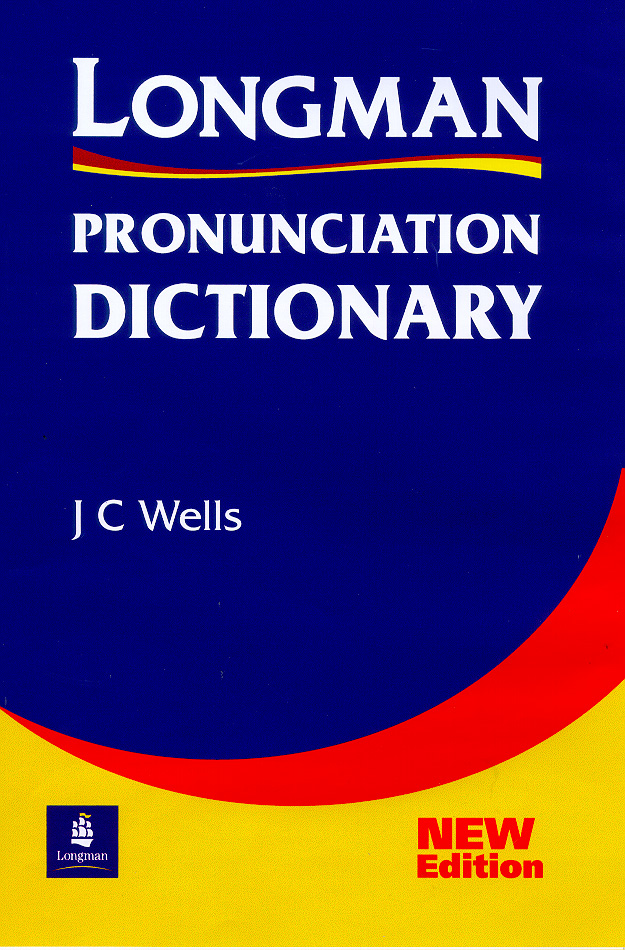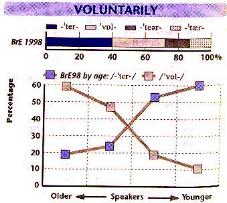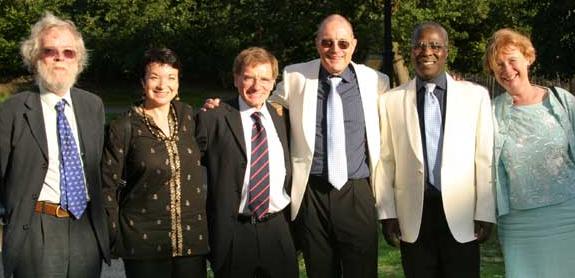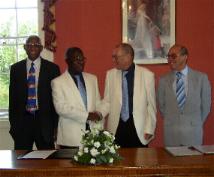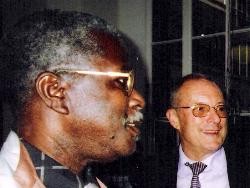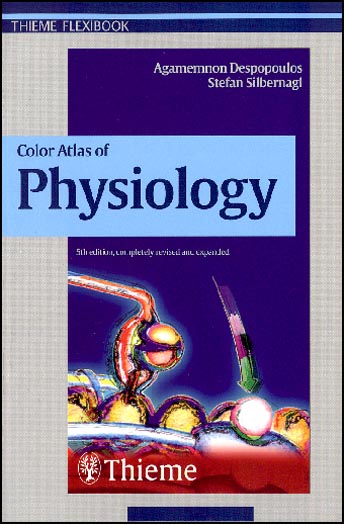DEPARTMENT OF SPEECH, HEARING & PHONETIC SCIENCES UCL Division of Psychology & Language Sciences |
 |
My phonetic blog — Sep 2006John Wellsemail: To see the phonetic symbols in the text, please ensure that you have installed a Unicode font that includes all the IPA symbols, for example Charis SIL (free download).
|
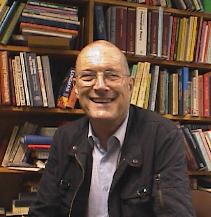 |
| Wed 27 September 2006 | There will now be a short interruption in this blog. I am off to Poland for a few days, namely to Adam Mickiewicz University, Poznań, to do some lectures on phonetics for their Esperanto-medium postgraduate program in Interlinguistic Studies. The blog will resume on Tuesday 3 October. | ||||||||||||||||||||||
| Tues 26 September 2006 | Does mile rhyme perfectly with trial? Does owl rhyme with vowel? Does oil rhyme with royal? I suspect that for most English people the honest answer to all three questions is “yes”. (I’m prepared to concede that it is not so for everybody, and in particular not for Geordies, as well as not for the Welsh and the Scottish.) This is part of the more general collapse of the contrast between long vowel plus /l/ and long vowel plus /əl/. You’d never guess, though, from the entries in pronouncing dictionaries. Here’s what they say for these words.
Thus EPD implies a categorical distinction in the pronunciation of the rhymes. Gimson, when I was a student of his forty-five years ago, was already then pointing out that this was nonsense. (I don’t know why EPD’s entry for royal includes a stress mark. The EPD convention is that syllable boundaries in words of more than one syllable are shown by a full stop, and monosyllables carry no stress mark. So this entry is self-contradictory: if the word were disyllabic, it would include a syllable boundary; if it were monosyllabic, it wouldn’t have a stress mark. Given that there is no stress mark at loyal, it’s probably just a mistake.) In LPD I apply a complicated convention — perhaps too complicated — to try and allow for the rhymes to be identical, while not insisting that they must be. The raised (= optionally inserted) schwa in the transcriptions of mile and oil allows for the ‘breaking’ that leads some speakers to insert a schwa glide between the vowel and the l. The slur mark, reproduced here as an underline, in the transcriptions of trial, vowel, royal allows for possible ‘compression’, i.e. the squeezing of the two syllables into one. If mile gets a schwa and trial gets compressed, they end up rhyming perfectly. LPD also allows for the possibility of Smoothing, i.e. the loss of the [ɪ] element in trial and the [ʊ] element in vowel. That’s how people like me can end up with trial and vowel as near-rhyming monosyllables [traːɫ, va̠ːɫ] — variants in no way catered for by EPD. |
| |||||||||||||||||||||
| Mon 25 September 2006 | Being the son of an Anglican clergyman, I have been accustomed from my earliest years to singing hymns, both at school and in church. The pronunciation used in hymn-singing is subtly different from ordinary conversational pronunciation. It is ‘over-articulated’: in particular, there is less vowel reduction. The ending ‑ed after alveolar plosives is usually /ed/ rather than /ɪd/ or /əd/. The ending ‑(e)s after sibilants is usually /ez/ rather than /ɪz/ or /əz/. The endings ‑less and ‑ness are unreduced /les, nes/. Not all vowels are strong, however. The preconsonantal indefinite and definite articles retain schwa: /ə, ðə/. So when we sing the anthem (based on Psalm 92) It is good to sing thy praises And to thank thee, O most high, Showing forth thy loving-kindness When the morning lights the sky. we expect /ˈpreɪzez/ and /ˈkaɪndnes/, as well as /tuː/ each time for to. In the morning and the sky, however, the is /ðə/. When singing, we all make these modifications without conscious thought. My partner Gabriel runs a choir for MOPPA, the Montserrat organization in London. Apart from me, the choir members are West Indians who came to London as adolescents or adults. Their pronunciation in singing is not very different from mine, but every now and again a word comes up in which I realize that I must modify my pronunciation to fit in with the rest of the choir. The anthem quoted above continues But the good shall live before thee, Planted in thy dwelling place: and there I have to remember to use a short vowel in planted rather than my usual /ɑː/. But the word that really caught me out was enemies. All thine enemies shall perish, Sin be banished from thy sight. In singing just as in other speech styles I normally pronounce it /ˈenəmiz/. But the rest of the choir has a different reduction vowel in the penultimate: they sing /ˈenɪmiz/. In the musical setting this syllable is somewhat prolonged, so that the vowel quality cannot be fudged or swallowed. And I have to remember to pronounce /ˈenɪmiz/ like the rest of the choir. | ♫ | |||||||||||||||||||||
| Fri 22 September 2006 | Jack Windsor Lewis adds some further observations on the pronunciation of -arily (blog, 18 Sep). He was interested in the relatively high proportion (12%) of respondents going for /æ/. “Until the last decade or so I've thought of it as a Scotticism (cf Gordon Brown et al), but I've noted it increasingly from non-Scots in recent years. I still regard it as very unusual from GB speakers.” Scots constituted fewer than 5% of my respondents, so in the survey more non-Scots than Scots voted for /æ/. As he points out, our /e/ in Perry Mason and /eə/ in Cary Grant merely follow the usual spelling-sound correspondences (cf. ferry, merry, sherry, berry with /e/; vary, wary, scary, Mary with /eə/). The interesting case is Gary Cooper, which on the basis of the spelling would be expected to have /eə/ but which actually has /æ/. (Since Gary Cooper’s time Gary has become widespread as a first name, with an established pronunciation /ˈgæri/.) Although all other -ary words in which the vowel is stressed have /eə/, there are veərious other cases of arV that are pronounced with /æ/: Harold, arid, baron, apparent (but compare parent with /eə/). As a girl’s name, Sharon has /æ/, but as a place name, e.g. in the expression rose of Sharon, it seems usually to have /eə/. (And the Israeli politician is neither of the above.) |
| |||||||||||||||||||||
| Thur 21 September 2006 | I am not the only senior academic retiring at this time from UCL Phonetics and Linguistics. Yesterday was Neil Smith’s leaving do. This took the form of a half-day conference of papers by his former students. The most moving contribution was that made by the distinguished poet Jack Mapanje, who after getting his PhD under Neil’s supervision returned to Malaŵi and amongst other things became Head of the Department of English at the University of Malaŵi and set up a Linguistics Association for Sub-Saharan Africa. He was then imprisoned without charge or trial by the Banda government. Neil co-ordinated the worldwide campaign for his release. He now teaches at Newcastle University. For me the most interesting of the papers delivered was the one by Geoff Pullum, former lecturer in the Department and co-founder of the excellent and widely read on-line Language Log. Entitled ‘Render unto syntax the things which are syntax’, it treated the X or no X construction: The Oscars show will go on, war with Iraq or no war with Iraq. At first sight it appears that the two X strings (here war with Iraq) have to be identical. If they’re obviously different, the result is unacceptable: ??The Oscars show will go on, war with Iraq or no winter Olympics. However closer inspection shows that the second X can be subject to various modifications, including ellipsis and the interpolation of expletives, usually obscene. Examples Geoff unearthed from the web included War with Iraq or no war __, the Oscars show will go on ...willingness to print this story, anonymous source or no __ file server or no damn file server day trip or no bloody day trip What Geoff didn’t discuss at all was the intonation of this construction. As far as I can see, it is obligatory to have a nuclear accent on the no, with the second X unaccented in the tail of the IP. This fits in with the general principle that we don’t accent ‘old’ items (repeated information). war with Iraq or no war with Iraq anonymous source or no day trip or no bloody day trip The expletive, if there is one, is unaccented too. |
| |||||||||||||||||||||
| Wed 20 September 2006 | Michael Ashby has an excellent article in the Journal of Pragmatics, ‘Prosody and idioms in English’ (JPrag 38: 1580-1597). You can see an abstract here. The whole of Volume 38 Issue 10, in which it appears, is given over to ‘The prosody-pragmatics interface’, and includes papers given at a conference on that topic held at the University of Central Lancashire nearly two years ago. Michael’s article starts by considering certain idiomatic expressions: to have eyes in the back of one’s head — and notes how changing the location of the nucleus creates a humorous or bizarre effect: to have eyes in the back of one’s head. He goes on to consider a whole range of intonationally-restricted idioms: to have a bee in one’s bonnet it was pouring down they’re rolling in money Although for EFL purposes it is convenient to say that some of the prosodic properties of idioms are arbitrarily fixed, he argues that this is not actually the case: rather, it is the focus that is fixed; the bizarre effects than can arise through manipulating the prosody do so because they “set the listener the perplexing puzzle of trying to impose a focus distinction between entities that are not separate meaningful items”. Thought-provoking. |
| |||||||||||||||||||||
| Tues 19 September 2006 | Yesterday I flew up to Scotland in order to attend the funeral of William Auld. As I said in my brief contribution to the funeral service, Auld was a dominant figure — no, the dominant figure — in Esperanto literature of the second half of the twentieth century. His masterwork La Infana Raso (1956) is a soaring edifice of an epic showing the puny insignificance of our individual lives in the context of the vastness of the universe and the eternity of time. I read it when I was in my early twenties. It affected me deeply. I am proud to say that Auld and I later became personal friends. He was the only Scottish poet (in any language) to be nominated for the Nobel Prize for Literature. His stature explains why yesterday to the small town of Dollar there came mourners not only from Scotland but also from further afield, including the international president of the Esperanto movement, Prof. Renato Corsetti, who had flown in from Italy, and others from Denmark and Luxembourg. A viral email message swept around the world urging Bruligu kandelon omaĝe al William Auld (light a candle in honour of William Auld); there are messages of condolence here. PS: There’s an obituary in today’s Guardian. After the funeral, since I had a few hours before my flight back to London, I went for a drive around the beautiful Scottish countryside. One village I passed through was called Muthill. My first thought there, of course, was: how is this placename pronounced? Is it Mut-hill, /ˈmʌthɪl/? No, apparently it’s Mu-thill, /ˈmjuːθɪl/. But this must be a spelling pronunciation, given the claimed Gaelic etymology Maothail. Gaelic has no [θ], and the Gaelic spelling ao stands for a close back unrounded vowel of the [ɯ] type. |
| |||||||||||||||||||||
| Mon 18 September 2006 | Just as we Brits often adopt American vocabulary innovations, so also do we sometimes adopt American pronunciations for existing words. Recently I’ve been noticing people in London stressing French-derived disyllables on the final syllable rather than on the initial, as is usual in BrE. Instead of /ˈkæfeɪ/ for café I have several times heard /kæˈfeɪ/. For potpourri I shall clearly have to change the priorities in the next edition of LPD and follow EPD in making /ˌpəʊpuˈriː/ first choice rather than the traditional, and current LPD preferred form, /ˌpəʊˈpʊri/. Steve Akamatsu of the University of Leeds wrote to me recently about the stressing and vocalism of -arily adverbs (necessarily, temporarily, customarily, militarily etc). Like the rest of us, he had noticed the traditional RP weak suffix /‑(ə)rəli/ being supplanted by a stressed /‑ˈerəli/. I referred him to the LPD entry for voluntarily, where there is a graph displaying the progress of this change over apparent time. The older respondents in my 1998 survey mostly voted for initial stress ˈvoluntarily, the younger ones mostly for antepenultimate volunˈtarily. However not all of those who stress the suffix pronounce it with /e/. Some use /æ/, some use /eə/. In my survey 40% voted for /‑ˈter-/, 15% for /‑ˈteər-/, and 12% for /‑ˈtær-/. (The remaining 32% voted for initial stress /ˈvɒl-/.) These facts strongly suggest that the habit of stressing the suffix is of American origin. This would explain why we Brits cannot agree what the stressed vowel should be. As we know, many (most?) Americans do not distinguish between merry, marry and Mary; but everyone in Britain does. So when we are faced with an American [ɛ] before /r/ we don’t know which British vowel to map it onto. Some of us choose one, some choose another, some choose the third. Presumably in time we shall settle down, as we did with Perry Mason (/e/), Cary Grant (/eə/) and Gary Cooper (/æ/). My guess is that ultimately -arily will join any and many as exceptional cases in which the spelling a corresponds to the pronunciation /e/. |
Perry Mason, Cary Grant, Gary Cooper | |||||||||||||||||||||
| Sat 16 September 2006 | I spent yesterday morning being interviewed yet again about cow dialects. This time it was a German television station. The filming we did in London will be followed up by a live session in Cologne. I agreed to do the interview because the main point they will be making, they say, is how the media distort and sensationalize scientific findings — or in this case the absence of scientific findings. We did the interview in German, which went well enough. But as a final touch the interviewer thought it would be nice if I declared in several different languages that I think it unlikely that cows moo in regional dialects. There are five languages which I know more or less well enough to do a radio or television interview: in the order in which I learnt them, English, French, Esperanto, German, and Welsh. I uttered my declaration successfully in English, German, and Esperanto. But when I came to attempt it in French and Welsh I found myself tongue-tied. I couldn’t immediately think of the French for ‘to moo’ (meugler), I couldn’t think of the Welsh for ‘cows’ (bychod), although I know those words perfectly well. I found it unexpectedly impossible to switch instantaneously between foreign languages, although each on its own would probably have been OK. |
| |||||||||||||||||||||
| Fri 15 September 2006 | The reason that eggcorns (blog, 7 Sep) arise is that people listening to speech struggle to make as much sense as they can out of what they hear, or think that they hear. They are prepared to override the prima facie evidence of actual speech sounds in favour of something slightly different that seems to make better sense. Recently I gave a phonetic dictation to a group of mainly non-native students of English, expert users of the language and phonetically very knowledgeable. It included the expression run over by a tram. The word tram /træm/ may not have been familiar to everyone: it is a specifically British word (the American equivalent is a streetcar), and even in Britain trams largely disappeared in the middle of the last century and have only recently begun to reappear in some of our larger cities. Some of the students heard the word as truck /trʌk/, a more familiar word and one that made sense in the context — but which nevertheless meant that they not only misidentified the vowel, which might be reasonable, but heard /m/ as /k/, which is not. One person heard tramp, which differs by only one extra segment from tram but is not very plausible from the point of view of making sense. I suspect a lot of foreigners’ errors in dictation exercises, and more generally in listening comprehension, are of this type. |
| |||||||||||||||||||||
| Thur 14 September 2006 | Joyce Cheng writes from Hong Kong to ask about the pronunciation of the name of the seventeenth-century Baroque composer Johann Pachelbel. In English &mdash or in English English at any rate — he’s usually known as /ˈpækl̩bel/. That’s the pronunciation the radio station Classic FM uses every time it plays his Canon (which is frequently). I suspect some Americans might say /ˈpɑkl̩bel/. But it’s a German name, and his pronunciation in German seems somewhat uncertain. My trusty Duden Aussprachewörterbuch says Pachelbel ˈpax&#xɛlbl̩, ˈpaxl̩bɛl; paˈxɛlbl̩ It’s unusual for Duden to give three different variants for a proper name, and it’s extremely unusual for a German syllable to begin with [x], as in the third variant mentioned (the only other example I know of is the noun Wacholder ‘juniper’ [vaˈxɔldɐ]). Wikipedia, for what it’s worth, nevertheless confidently gives only [paˈxɛlbl̩]. The article appears to be otherwise reliable (you never know with Wikipedia): it seems very well informed about his life and works. |
| |||||||||||||||||||||
| Wed 13 September 2006 | Jack Windsor Lewis takes exception to my assertion yesterday that “LPD broke new ground in giving /ləs, nəs/ rather than /lɪs, nɪs/ as the first preference for -less, as in careless, and -ness, as in kindness”. He points out, quite rightly, that his Concise Pronouncing Dictionary of British and American English (OUP 1972) anticipated this by eighteen years. I confess that I was implicitly comparing LPD only with the Jones / Gimson / Ramsaran / Roach EPD (which has now, of course, caught up). Jack’s CPD was in fact so concise that it didn’t actually contain entries for such everyday words as aimless, careless, pointless, useless. The user had to infer their pronunciation from the base form plus the laconic entry less les suffix ləs But there it is — no truck with lɪs. And the same with -ness: just nəs. Jack comments further, “My Guide (1969) p. 83 had commented ‘The endings -less and -ness although still shown as /ɪ/ by Gimson in the DJ EPD are in fact not usually pronounced today with the "clear" vowel of list ... etc.’” I hold up my hands and concede priority. |
| |||||||||||||||||||||
| Tues 12 September 2006 | Every day The Guardian newspaper publishes Corrections and clarifications. Yesterday’s paper included the following.
I am showing my age when I reveal that for me not only is chartered /ˈtʃɑːtəd/ different from charted /ˈtʃɑːtɪd/ and tendered /ˈtendəd/ from tended /ˈtendɪd/ but also that for me affect (verb) /əˈfekt/ is not a homophone of effect /ɪˈfekt/. All my twenty-year-old native English students seem to have affect and effect as homophones, both with /ə-/. And an awful lot of them pronounce -ered and -ed as homophones too, both with /-əd/. Evidently the Guardian reporters who misheard or misspelt tend(er)ed and chart(er)ed do the same. In England it seems to be along the east coast that the drift from weak /ɪ/ to /ə/ is at its most general: in Norfolk, for instance, or in Geordieland. Elsewhere, it is a well-known characteristic of southern hemisphere English, as well as of most rhotic accents. Among public figures, Tony Blair is one who uses a striking number of schwas where traditional RP would have /ɪ/. My LPD broke new ground in giving /ləs, nəs/ rather than /lɪs, nɪs/ as the first preference for -less, as in careless, and -ness, as in kindness. Although in EFL we traditionally teach that the verb ending -ed is pronounced /-ɪd/ after alveolar plosives (as in waited, faded, painted, landed), Maidment & Lecumberri’s book English transcription course prescribes /-əd/. | ə | |||||||||||||||||||||
| Mon 11 September 2006 |
| ||||||||||||||||||||||
Everything went marvellously on Friday. The sun shone, there was a great turn-out of families and friends, there was a really good feeling. The only slight hitch was that a coach bringing thirty guests from north London got lost, so that we were fifteen minutes late starting. The Registrar did a really professional job, setting everyone at ease and maintaining a light touch throughout. As well as the formal Declarations required by law and the pledges we made to one another, I read a 400-year-old poem by Sir Philip Sidney and Gabriel sang, in his fine tenor voice, a song by Stephen Schwartz. My true love hath my heart, and I have his, By just exchange one for another given: I hold his dear, and mine he cannot miss, There never was a better bargain driven: My true love hath my heart, and I have his... In whatever time we have, for as long as we are living, We can face whatever comes, if we face it now as one. I could make it on my own, now I know I don't have to, No one really wants to be alone, in whatever time we have... After the ceremony we had drinks in Morden Park (fortunately the weather was good). Then there was a meal in a cheerful Latin American restaurant and finally a party back at home until the small hours of the morning. I am still coming down off my high. Our fundraising page amassed over £1300, which has gone to Diabetes UK. Thank you everyone! |
| ||||||||||||||||||||||
| Fri 8 September 2006 | I was evidently wrong to suppose that Americans don’t say aren’t I?. Karen Davis of the University of Maryland writes to say, “Iím an American, and I have to say Iíve said ďarenít IĒ all my life. I canít think of what else youíd say, for that matter. In fact, we use it in more than tags Ė we use it in questions (why arenít I in charge here?, arenít I invited?). We might not write it that way in formal writing, but a quick look at Google shows we write it in blogs and such. I canít imagine saying ďAm I not invited?Ē unless I intended to stress the Ďnotí in a way that made the sentence mean Ďhave I been insulted?í” Charles Prescott, of the University of Sussex, takes issue with the way I formulated the intrusive r rule (blog, 5 Sep). He claims the left-hand environment should be RTR (= retracted tongue root, otherwise [-ATR]). He would then classify the NEAR vowel as high and RTR (whereas I obviously can’t classify it as high, since by my rule a high vowel would not trigger r-linking, which NEAR does). Since he also classifies /r/ as an RTR glide, his rule gains in naturalness by inserting an RTR glide after an RTR vowel.
| ||||||||||||||||||||||
|
But now I must forget phonetics for a few hours. The eagle-eyed readers among you will have become aware that today is a very special day for me. This afternoon my long-term partner Gabriel and I will go to our local Registry Office and, in front of a hundred guests, take on the legal status of Civil Partners. Those who have read my personal history or looked at the fund-raising page shown above will know that he and I have been together since 1968. Civil partnership, introduced into UK law at the beginning of this year, means that the state at last formally recognizes our status as a couple. We will be treated like spouses for pension purposes; we will be recognized as next-of-kin if one of us has to go into hospital or dies; we will be able to bequeath money and property to one another without incurring Inheritance Tax. Now we will be publicly committed one to the other. It promises to be a wonderful day. |
| ||||||||||||||||||||||
| Thur 7 September 2006 | Browsing around in the Eggcorn Database I find that it includes several distinctively British eggcorns. One such is based on our slang expression can’t/couldn’t be arsed meaning ‘can’t/couldn’t be bothered’. It changes arsed into a euphemistic asked. The first example given is “There was a whole lot more to it but I canít be asked to type it”. Here are some more examples, “captured in the wild”:
The blogapotamus website has a whole category of entries called Can’t be Asked to Categorize. Judging by the form of the tag in Iím getting too attached, arenít I? in one of the entries, it appears to be a British site, as are most of the sites from which the examples above are taken. (Americans don’t say I am, aren’t I? We do. Or at least that’s how we spell [ɑːnt] in this context.) As an ordinary vocabulary item asked, the past tense of ask, is frequently pronounced without the [k]. In its LPD entry I write it as ɑːskt, showing by the italicization that the velar plosive can be omitted. If it has no [k], it is homophonous with arsed, which explains our eggcorn. Although we are very ready to elide the [k] in asked, we are not so ready to do so in other -sk past tenses: masked, basked, tasked, whisked, tusked. Nor can we readily elide the [p] in clasped, rasped, lisped, cusped. (OK, in rapid speech I concede that they all might go.) |
| |||||||||||||||||||||
| Wed 6 September 2006 | Although they will sometimes try to kid you that it isn’t so, most Americans completely neutralize the /t ~ d/ opposition in the t-voicing environments. (These environments are: between two vowels, the second of which is weak; or word-finally between any two vowels.) For example, atom and Adam are homophones in American English; so are shutter and shudder, and so (usually) are right away and ride away. However, attain and a Dane remain distinct, as do to tie and to die. Those of you who read Language Log may be familiar with the notion of eggcorns. An eggcorn is, for example, saying to hone in on instead of to home in on, or indeed eggcorn instead of acorn. It’s a bit like a folk etymology, a bit like a mondegreen, a bit like a malapropism, but different from them all. The Eggcorn Database lists hundreds of them, from renewing your wedding vowels to pus jewels (= pustules). It also classifies them by type, and has over a dozen that depend on t-voicing (or t-flapping, as the Americans usually call it): driving a Catillac, radifying an agreement, color-coated keys, you don’t know me from atom. These eggcorns simply don’t work in British English, because we don’t do t-voicing. | ||||||||||||||||||||||
What categories of eggcorns do we have in Britain, that perhaps Americans don’t have? The best example I can think of is a volcano spewing larva (= lava). Google shows 156,000 hits for "volcano AND larva" (of which some, admittedly, are about insect life around volcanoes). Here are some authentic examples from the web:
But perhaps that’s just a spelling mistake rather than a real eggcorn. | |||||||||||||||||||||||
| Tuesday 5 September 2006 | Further to the question of simulated rhoticity, Andrej Bjelaković writes, “I would like to add my own thoughts concerning the linking/r/ - intrusive /r/ usage. English is my second language, while my first language (Serbian) is rhotic, i.e. we always pronounce every 'r' that is written. So although when speaking RP I have no trouble dropping the Rs when needed, and pronouncing them when a suitable situation for linking /r/ occurs, I find it difficult to extend that to intrusive /r/. Simply put, it takes a conscious effort for me to pronounce an /r/ that actually isn’t there.” — which indeed betrays a thoroughly orthography-based approach. From the point of view of native speakers of non-rhotic English, we’re not “pronouncing an /r/ that isn’t actually there”; we just pronounce things in the way that comes most easily and most naturally. What feels unnatural is forcing ourselves to avoid intrusive /r/. Our r-insertion rule can be formalized as Ø → r / [V, -hi] __ #₀ V (insert r after a non-high vowel if a vowel follows immediately within the word or across a word boundary). It makes no reference to spelling. There is an interesting quote from Hugh Laurie in Wikipedia. He is reported as saying, apropos of keeping up the American accent in his role as Dr House, “It’s the hardest single thing in my day; I find it incredibly difficult. You see, half of my brain — and it’s not a big brain to start off with, but anyway — half of it is devoted to playing the character, the other half is listening to myself and censoring myself and adjusting myself and, er, the third half — yeah, now you see the problem — the third half is having to tell the second half to ‘Shut up!’ because I end up looking like I'm just on Valium all the time, because I’m having to think so hard about how an American would say it.” | ||||||||||||||||||||||
| Monday 4 September 2006 | Sam Wood comments on Masaki Taniguchi’s observations about the confusion of [f] and [θ] in London speech. “Not so long ago, I was having a manicure (as one does) and was talking to the therapist about what she had to study to do what she did, and one of the things she mentioned studying was [θɪzi]ology. At first I didn't know what she was talking about, but then realised that she was producing a hypercorrect form of the word physiology. I found this very strange, especially since if she had to study it, surely she’d seen it written (or had to write the word herself) and knew it was spelt with an initial ph-, which couldn’t possibly correspond to a dental fricative. Does this mean that spelling has absolutely no effect on the possibility of hypercorrection? I just find it slightly hard to believe that speaker’s perceptions of the dental fricative (for example) being ‘more correct’ than the labio-dental fricative in absolutely every context completely overrides their knowledge of spelling and its relation to pronunciation.” My own view is that most speakers take much less account of spelling than the speech-conscious assume. I have certainly heard Londoners saying [ˈθeðə] for [ˈfeðə ~ ˈfevə] feather. Consider also the great difficulty we non-rhotic speakers have in avoiding intrusive /r/ while retaining linking /r/ — we just haven’t got time, in the flow of speech, to stop and think whether a given word is spelt with or without an r. To stop ourselves pronouncing an /r/ at the end of Malta in Tell me how far away Malta is we usually also have to stop ourselves pronouncing an /r/ at the end of Gibraltar in Tell me how far away Gibraltar is. We have a corresponding difficulty in putting on a rhotic accent. The rule is simple: if there’s an r in the spelling, pronounce an /r/. But it can be quite difficult to apply this rule in real time. Hugh Laurie in ER is unusually talented in this respect: he gets it right. Personally, if I try to talk American it is only with conscious self-monitoring that I can stop myself from saying things like [ˈfɑːrðɚ] instead of [ˈfɑːðɚ] father. In my own accent, of course, father is a homophone of farther, both [ˈfɑːðə]. My unconscious default stratagem to make my speech rhotic clearly does not refer to the spelling, but says ‘add r-colouring to every [ə ɜː] and insert /r/ after every /ɑː ɔː/’. That’s why it gives quite a few wrong results. |
| |||||||||||||||||||||
| Saturday 2 September 2006 |
| This appeared in last Sunday’s Observer newspaper. I have only just seen it. I fear my scholarly reputation must have been destroyed for ever. For the record, I have never claimed that cows moo with a regional accent. At least the Observer, unlike some, didn’t report me as saying ‘this phenomena’. | |||||||||||||||||||||
| Friday 1 September 2006 | I have been marking examination scripts. Candidates had to take an ordinary orthographic English text and turn it into phonetic transcription. Most of this batch of examinees are not native speakers of English, although they are very fluent users of the language and know a great deal about English phonetics. (You know who you are.) A surprising number of candidates of this type are evidently unaware of certain very easily stated generalizations about the relationship between English spelling and sound (graphemes and phonemes, to be technical). One such generalization is that when the spelling is c, the sound may be /k/, /s/, or indeed /ʃ/; but it is NEVER /z/. Yet speakers of Spanish and Scandinavian languages, precisely the ones who have no /s - z/ contrast in their own L1, frequently demonstrate that they are unaware of this rule. The examination passage for transcription included the words conscience, piece and dance. Repeatedly I found them transcribed /ˈkɒnʃənz/, /piːz/ and /dɑːnz/ instead of the correct forms with final /-s/. Another such rule concerns the letter a, which may correspond to /æ/, /ɑː/, /ə/ and various other vowels, but NEVER to /ʌ/. This is where speakers of Spanish and, particularly, Japanese tend to err. But I expounded this rule twice in the lectures leading up to the exam, and I am gratified to say that on this occasion no candidate made that particular error. No one offered /ɪˈrʌk/ for Iraq. People (including me) often complain that English spelling does not enable you to predict the pronunciation with any certainty. So where there is a consistent (non-)relationship, learners should be aware of the fact. |
| |||||||||||||||||||||
Archived from previous months:
my home page


